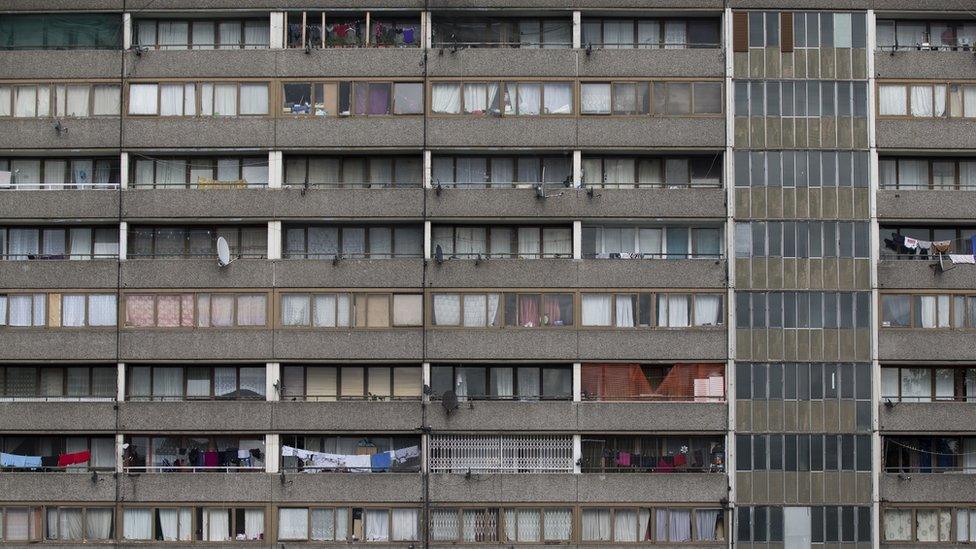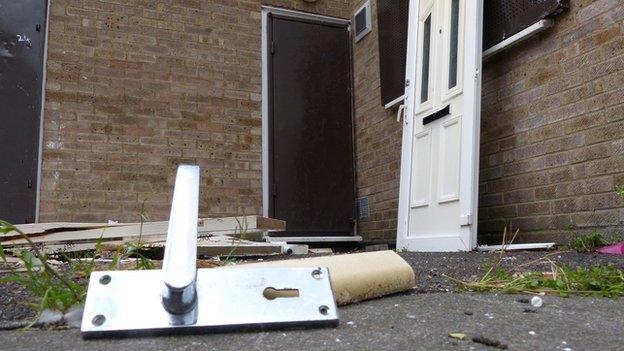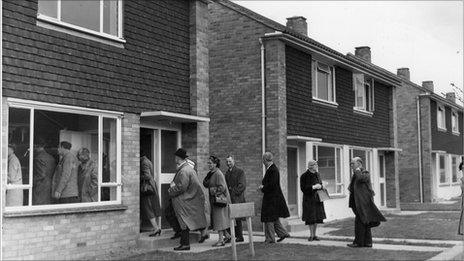Third of homeless Londoners moved out of their boroughs
- Published

Nearly 15,700 households were placed outside of the boroughs responsible for housing them
A third of homeless families in temporary accommodation in London have been moved outside of their boroughs, according to new figures.
A Freedom of Information request showed 49,536 households were being housed temporarily by 33 local authorities from March to August 2015.
Around a third of them - 16,981 households - were placed outside the boroughs responsible for housing them.
London Councils said authorities were "in the midst of a housing crisis".
'Unsettling experience'
Kensington and Chelsea and Waltham Forest councils both housed more than two thirds of temporary households outside their borders.
Meanwhile, Hammersmith & Fulham housed homeless people in 28 other London boroughs, and Wandsworth housed people in 26 other parts of London.
Naomi Emmanuel, 24, and her two-year-old daughter Kira are among the more than 30,000 households with children who are in temporary accommodation across the capital.
The fashion graduate and former nursery nurse ended up homeless after her mother died.
She said she was moved five times over two years between three different London boroughs - an experience which was unsettling for her toddler and also prevented her from holding down a job.

Melaku Ader was moved to Liverpool but has returned to east London where he is living in a homeless hostel
"I had to take her out of nursery with a day's warning. I had to quit a job with a day's warning," she said.
"If I could afford private renting I would definitely have done that instead of being placed wherever the council feels like placing us.
"I like being in control of my own life which is why I worked and studied to be in control of my future.
"It's unnerving, having to wait for a letter to find out where we're going to be moved."
According to the Freedom of Information responses, 26 of all 33 London councils moved homeless households to other parts of the South East.
Eight councils moved people into temporary accommodation in the Midlands and the north of England, the figures showed.
While families can request a review of their case, they have no choice about where they could end up, according to Kate Webb, from the housing and homeless charity Shelter.
She said: "If you are sent to Birmingham and you refuse to go, the council can say you have intentionally made yourself homeless."
'Feeling isolated'
Melaku Ader, 36, took up the offer of moving to Liverpool after finding himself homeless when his construction job on the Olympic Stadium ended.
However, he was left feeling isolated and after two years he returned to east London where he is living in a homeless hostel.
He said: "I had many friends in London. When I went to Liverpool it was too hard for me to find friends and enjoy [life]. It was just me."

The Ocean Estate in Tower Hamlets is one site where new affordable homes were being built in the borough
Newham and Brent had the highest number of households in temporary accommodation, while Brent was also the borough with the highest number of homeless households with children.
The longest a household spent in temporary accommodation according to the figures was 22 years in Tower Hamlets.
The council's mayor John Biggs said a 22-year wait was "shockingly unusual" and the average wait for a permanent home in the area was about seven years.
He hopes developments like the Ocean Estate with a mix of 225 new affordable homes will ease the pressure.
He added local authorities across the capital were struggling to house homeless people because of rising rents and fewer council homes.
Mr Biggs said: "When we need to place homeless families we need to go somewhere that is affordable and very often these days that's not in your own borough.
"It is a continuing nightmare finding temporary accommodation for people.
"We need to work hard to get people into permanent housing."

Mayor of Tower Hamlets John Biggs said the average wait for a permanent home in the borough was about seven years
Some 29 of the councils spent more than £358m in total providing temporary accommodation from 2012 to 2015.
The highest spend was in Enfield with more than £81m from 2012 to 2015.
The Department for Communities and Local Government said it was the responsibility of councils "to house families in settled accommodation as quickly as possible" and said it had given them new tools to offer quality accommodation in the private sector to families as well.
A spokesman for London Councils said local authorities in the capital were doing their best "to give people a roof over their heads in the midst of a housing crisis".
- Published15 May 2015

- Published14 April 2015

- Published22 June 2015

- Published22 July 2014

- Published30 July 2014
